Noel Pemberton Billing and the Cult of the Clitoris
One of the more fun games historians play is constructing an alternate history – a view into the possible ways things could have happened differently. Usually a pivotal event in history is taken, a flimsy justification is found for making it turn out differently, and then the consequences are played out from there. One such event is the First World War. In our history (spoilers) Germany lost. Some refused to accept that they could have been defeated without internal treachery, and a culture of resentment eventually crystallised around a charismatic leader resulting in war breaking out again. It’s not hard to see how the same thing could have happened in Britain if the roles were reversed – in fact, when the war began dragging on longer than anticipated, some were quick to insist that only treachery could cause such a divergence from their expectations. One of the most notable examples was Noel Pemberton Billing.
Billing was born on 31st January 1881 in Hampstead, a suburb of London. His father was an iron-founder (the supervisor of a blast furnace) from Birmingham, and this may have explained Billing’s lifelong fascination with technology. At the age of thirteen he set fire to the headmasters office at his school and ran away from home, working his passage on a ship to South Africa. There he worked as a manual labourer until he was old enough to enlist in the mounted police force, where he displayed a talent for boxing. He moved from that into the British Army at the age of 18, one of those who joined to fight in the Boer War. He was wounded twice in the fighting and wound up being invalided out of the army in 1901. In 1903 he returned to England where he used his savings to open a garage in South London. Accounts vary as to how well the garage did – some say it did well, others that it failed and he returned briefly to South Africa where he worked as a horse trader and, significantly, founded a specialty paper for motorists. In either case he wound up with enough money to pursue his real dream – aviation.
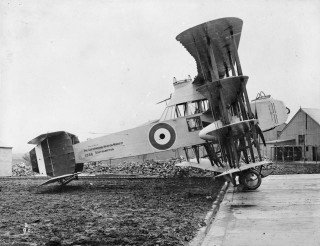
In 1908 he opened an aerodrome in Farnbridge in South Essex, and this funded his own experiments in building airplanes. These were not successful however, nor was his attempt to raise further financing through gambling in Monte Carlo. In 1909 he founded an aeronautical periodical called Aerocraft, but it folded due to poor sales. He also lobbied Parliament to establish a separate wing of the armed forces for airplanes, but this was ignored. [1] With the initial failure of his aviation efforts he was forced to diversify, earning a law degree while buying and selling land and, oddly, steam-powered yachts. It may be the latter that gave rise to his interest specifically in seaplanes. In 1913 he got back into aviation, making a bet with the aircraft manufacturer Frederick Handley Page that he would be able to pass the pilots license exam within a day of first flying a plane. [2] He won the bet, and with his winnings set up his own aircraft company.
His company swiftly gained a reputation for producing planes that looked amazing, but flew terribly. Only the outbreak of World War I in 1914 saved the firm. There was an immediate demand for airplanes from the War Department. Billing was there to meet that demand, and he also joined the Royal Naval Air Service. Despite his later claim to have commanded a squadron, the RNAS later said that he never rose past the rank of lieutenant. In 1915, disillusioned with the way the British were handling the air war, he resigned his commission. He also sold his company to his works manager, Hubert Scott-Paine, who renamed it “Supermarine”. [3] Now free of any possible accusations of having a conflict of interest, Billing set off into the uncharted waters of politics.
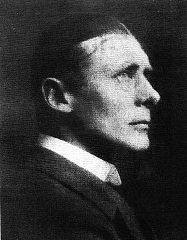
Billing made his first attempt to get into Parliament at a by-election in the East End of London (the district of Mile End) in January 1916. His speeches, promising that as a “proper airman” he would be better able to defend London against bombing by German zeppelins, [4] proved wildly popular. His statement that the East End was receiving less defence as it was the poorest part of London saw him denounced by the First Lord of the Admiralty. In order to defeat this suddenly surging independent (who had strong support from the press) the Liberals actually refrained from running a candidate (though it had previously been a Liberal seat) and told their supporters to vote Conservative. This worked, and the Conservative candidate won (by a relatively slim 10% of the vote). Undeterred by this, Billing stood again in March when a by-election was held in Hertfordshire (the county north of London). This time he defeated the Conservative candidate to take a seat in Parliament.
Billing’s time in Parliament was notable more for bombast than for any practical effect. He became known as the “Minister for Air”, as that was the primary focus of most of his speeches and questions. As such his primary achievement was to prompt the re-evaluation of the Navy’s plane designs. He would later claim credit for starting the process that led to the creation of the RAF, though given that most other countries also formed air wings of their forces after the war, that seems somewhat of a stretch. His secondary focus was treachery – the enemy within. Despite the fact that his own wife was half German he lobbied for all those of German extraction to be interned or deported. Naturally this was tinged with a virulent strain of all the usual prejudices of the day, as he also accused Jews and homosexuals of being part of the conspiracy. It was in order to better spread these views that he founded The Imperialist.

The Imperialist was discreetly funded by Lord Beaverbrook, the same peer who had founded the The Daily Express, which still runs today. In The Imperialist Billing argued that a secret German society called The Unseen Hand was deliberately working to staunch the British will to fight. Given the garbled reports of the Bolshevik Revolution in Russia reaching people, this seemed plausible to people who were looking for someone to blame for the poor progress of the war. In December 1917 an article in The Imperialist claimed that Germany was controlled by homosexuals, and they had sent agents into Britain to seduce young British soldiers. Quite how this would render them unfit to fight is left unsaid. In January 1918 they claimed that a “certain German prince” (later identified as Prince William of Albania) held a Black Book containing a list of 47,000 British homosexuals, who were all being blackmailed by the German secret service. [5]
The names of Privy Councillors, youths of the chorus, wives of Cabinet Ministers, dancing girls, even Cabinet Ministers themselves, while diplomats, poets, bankers, editors, newspaper proprietors, members of His Majesty’s Household follow each other with no order of precedence.
In February 1918 he renamed his paper The Vigilante, and published an article claiming the Germans had were deliberately spreading venereal disease through the British army (with some bonus antisemitism):
Germany has found that diseased women cause more casualties than bullets. Controlled by their Jew-agents, Germany maintains in Britain a self-supporting – even profit-making – army of prostitutes which put more men out of action than does their army of soldiers.
But it was the cover story on the sixteenth of February 1918 that would land Billing in court. Hearing that the Canadian-born dancer and actress Maud Allan was going to host a private performance of Oscar Wilde’s banned play Salomé (not technically illegal, since it would not be open to the public), Billing saw an opportunity. He had been targeting Margot Asquith, wife of the former Prime Minister Herbert Asquith, for some time and he now claimed that Margot and Maud were conducting a lesbian affair orchestrated by German puppetmasters. Furthermore he claimed that they were at the centre of a great conspiracy to enlist the wives of powerful men into what he called, with a typical lack of constraint, the “Cult of the Clitoris”.
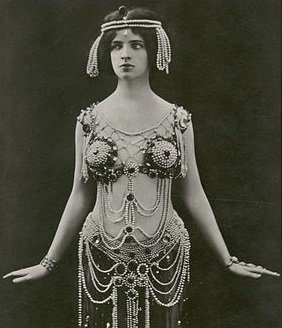
The story caused a huge storm of publicity, not least because most non-medical men had never even heard the word clitoris before this. Maud was forced to put the matter in the hands of her solicitors, though as she was actually a lesbian she knew that she would be on shaky ground. Still, Billing’s theories were clearly insane so she thought she had some hope. But this type of legal action was exactly what Billing had hoped to provoke, and he leapt at the opportunity to air his theories under the privilege of the court. Anything he, or his witnesses, said at the trial would not be actionable for libel, and they took full advantage of that.
Billing represented himself. One of his witnesses was Eileen Villiers-Stuart, wife of a captain who was serving abroad (and Billing’s mistress). She claimed to have seen the book, and to have seen both Margot and Herbert Asquith’s names in it. When the judge ordered her to leave the witness box, she retaliated by claiming to have seen his name in it too. Another of his witnesses was Harold Spencer, a writer for The Vigilante (who had been dismissed from the army in 1917 for “paranoid delusional insanity”). Spencer was the writer of the “Cult of Clitoris” article, and he defended it vigorously.
Such a play…. is one that is calculated to deprave, one that is calculated to do more harm, not only to young men and young women, but to all who see it, by undermining them, even more than the German army itself.
He also claimed to have seen the Black Book. He said that Alice Keppel, the King’s mistress, was listed there and had been acting as a secret go-between with Germany to negotiate peace talks.
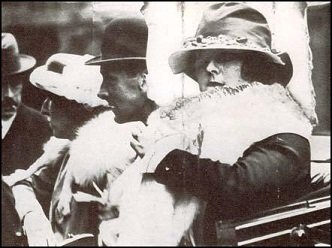
The trial was not just devoted to defending Billing. He also found time to dredge up what dirt he could on Maud. Her brother Theodore Durrant had been executed in San Francisco in 1898, after he had been discovered to be the notorious local serial killer “The Demon of the Belfry”. Theodore had murdered two women and hidden their bodies in his local church. It was because of this that Maud had changed her surname to Allan. Though the judge attempted to suppress this as irrelevant, Billing argued that it showed proof of Maud’s “depraved character” as genetic. Whether it was this or the perjury of Spencer and Villiers-Stewart that swayed the jury, or whether the simple fact of Maud’s sexuality meant that she was considered to be beyond the protection of the law, Billing was acquitted of all charges of libel. The audience in the courtroom greeted this vindication of his absurd theories with a standing ovation, and he was met by cheering crowds outside the courtroom. Not for nothing did Basil Thomson, head of Special Branch, write of the trial that “Everyone concerned appeared to have been either insane or to have behaved as if he were.” [6]
Billing rode the publicity from the trial to retain his seat in the General Election which immediately followed the end of the war, but that marked the high water mark of his popularity. [7] With the war at an end his primary focuses were gone, and the political establishment soon moved to rid itself of this thorn in its side. In December 1918 Eileen Villiers-Stewart was convicted of bigamy, and said in a sworn statement that her evidence in the trial was false, concocted and rehearsed in advance with Billing and Spencer. Harold Spencer, meanwhile, was convicted of criminal libel in 1920 for writing a pamphlet that claimed Churchill had conspired with the Jews in order to murder Lord Kitchener, lose the Battle of Jutland, and make a fortune on the US stock market. With both of his star witnesses tainted Billing’s victory in court now rang hollow. He retired from politics in 1921, citing health concerns. Many saw this as an excuse to avoid a humiliating defeat in the next election. [8]
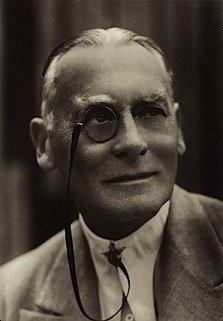
Billing was not entirely idle in retirement – in 1927 he wrote a play, High Treason. It was about the outbreak of a second World War in the 1940s between Europe and America orchestrated by a sinister cabal of arms dealers who find global peace cutting into their profits. The play was made into a movie in 1929, with an aesthetic “inspired by” Fritz Lang’s Metropolis. It wasn’t a success. Neither were Billing’s inventions – several variants on the gramophone system which proved overcomplicated, as well as multiple miniature cameras. He did remarry however, having a daughter and a son (who went on to become a theatre director in Bolton). With the outbreak of World War 2 he attempted to return to politics with one of his most notable proposals being the establishment of a separate “Woman’s Parliament” to handle issues affecting the home. Unsurprisingly the voters were not impressed. Though he stood in four by-elections he lost them all. He had vanished from public view, and his death in 1948 went unreported in the papers. Consigned, like his paranoid and hateful views, to the dustbin of history.
Images via wikimedia except where stated. Banner via the National Portrait Gallery.
[1] The RAF was founded at the end of World War I, when the advances in aviation technology during the war years made the importance of air power clear.
[2] A slight cheat, as he had attempted to fly his own planes, though unsuccessfully, five years earlier.
[3] The company would later create probably the most famous British plane, the Spitfire.
[4] It’s usually forgotten that the First World War saw London bombed by German air raids as well, though not to the same extent as the Second World War.
[5] The fact that any such blackmail would only be effective due to the prejudices of people like him was, of course, lost on Billing.
[6] As a result of the trial Maud was forced to leave the country. She moved to Los Angeles where she taught dance and lived a quiet life with her girlfriend Verna Aldrich.
[7] Of course, if the war had ended less well for Britain it’s easy to see how his theories could have been incorporated into a face-saving national fiction.
[8] In fairness it should be pointed out that his wife died of a long-running illness in 1923, which may have been a factor in his decision.
